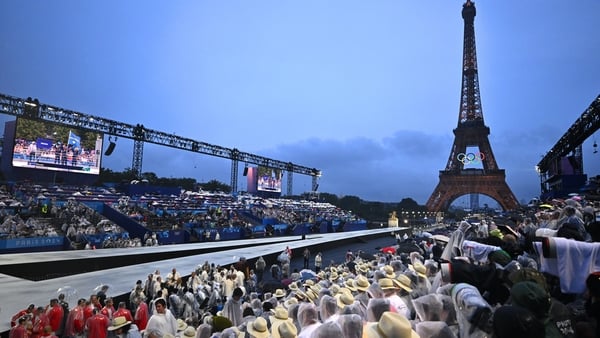"We'll always have Paris". Over 80 years ago, Humphrey Bogart's Rick uttered those words to Ilsa, played by Ingrid Bergman, in the classic film 'Casablanca'. Somewhere across the Christmas TV schedules, the 1942 hit is sure to get another airing; it has stood the test of time.
The 2024 Summer Olympic Games in the French capital, for many, will also find a residence in the memory bank.
Team Ireland secured its best-ever medal haul, comprising four gold and three bronze, across four sports. They came close to adding to that total in athletics, sailing, golf and slalom canoeing.
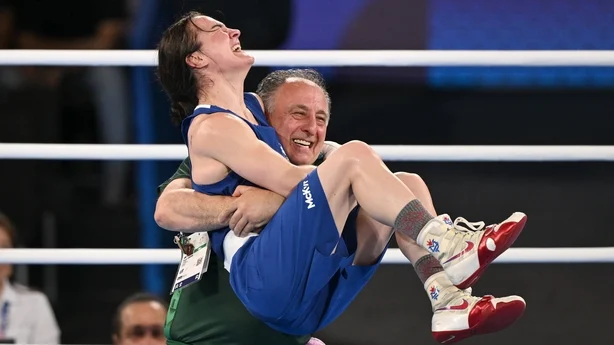
Boxing, not for the first time, provided a few contentious calls. Again, we questioned the decisions of those in the judges corner. Kellie Harrington, winning back-to-back gold medals by way of a split decision as the clock ticked near midnight at Roland-Garros, could not be argued with. A grand stage then for the Dubliner to complete her journey as an Olympian.
Elsewhere, Ireland celebrated medal success in rowing, swimming and gymnastics.
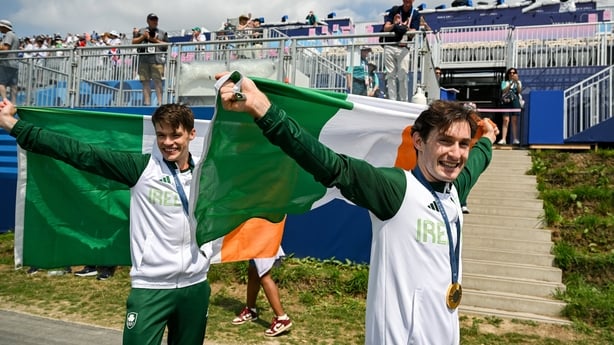
Philip Doyle and Daire Lynch then brought home bronze in the double sculls, a first heavyweight rowing medal for Ireland at an Olympics.
At the easily reconfigured Paris La Défense Arena, home to rugby's Racing 92, swimming took centre stage.
A wonderfully noisy, atmospheric venue, with no shortage of thrills across the eight days of action. The expectation was that Mona McSharry would make a successive final in the 100m breaststroke. But could she medal? The fact that she did in what was a blanket finish made her bronze all the more noteworthy. Clocking a time of 1:05.59, the Sligo competitor held off her nearest pursuers by 0.01 of a second.
Twenty-four hours later and Armagh's Daniel Wiffen, his county allegiance having been cleared up, was amongst the favourites to take gold in the 800m freestyle final, following on from his World Championship success in that event and the 1500m last February.
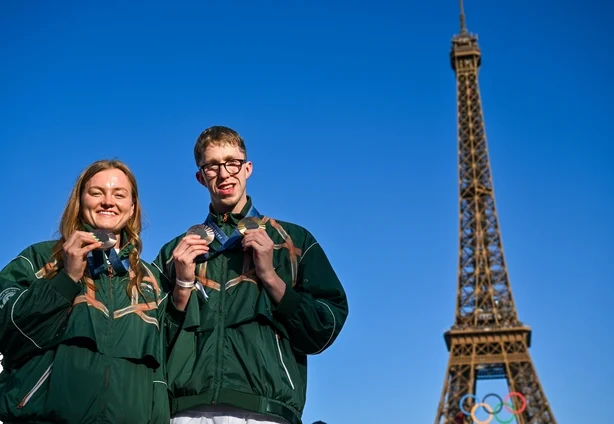
Five nights later and Wiffen went in pursuit of another gold. Such was Bobby Finke's dominance in the 1500m freestyle, it was now he who would not be caught. A world record that had stood for 12 years was well and truly smashed, with Wiffen settling for the bronze.
A swim in the Seine would follow for the Ulsterman, bringing the curtain down on his games. "The nerdy-looking athlete who wears glasses", as Time Magazine described him, certainly delivered. Wiffen's achievements saw him become the latest recipient of the James Joyce Award from University College Dublin's Literary and Historical Society.
Drawing inspiration from the work of Joyce, Wiffen told The Irish Times: "When I was reading up on this award, and saw that Joyce's quote, 'A man of genius makes no mistakes, his errors are volitional and are the portals of discovery’… I think that’s how we’re kind of related.
"So basically when you make a mistake, you see it from a learning point of view, like I did when I finished fourth twice at the 2023 World Championships. I used that to make me better and win Olympic gold in Paris."
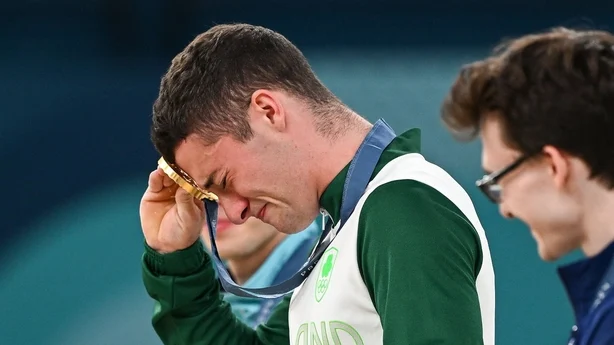
The middle Saturday of the Games saw Rhys McClenaghan duly add an Olympic gold to the two World and three European titles he had already won on the pommel horse. A "flawless routine" was the view from those who know most, with McClenaghan taking much satisfaction in coming out on top in "the toughest pommel horse final of all time".
The Co Down competitor would tell the world press that he daydreamed at school about gymnastic routines. A daydream believer, determined that his ambitions would be realised. More twists and turns, like those McCleneghan perfects on the horse, are sure to enthral us for a few more years yet.
But before that, you can watch Rhys performing a different discipline as he takes to the floor on Dancing with the Stars.
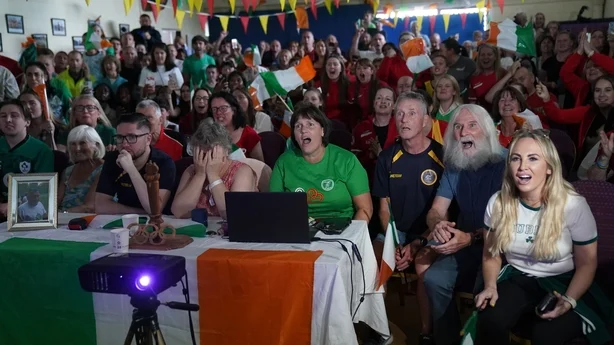
Success, ultimately, is judged by podium positions, but even in the near-misses, there was much for Team Ireland as a whole, the respective sporting bodies and the OFI to look back positively on after 17 days of competition in Paris.
And while Rhys McClenaghan dreamed of Olympic success more than a decade ago, few of us thought back then that an Irish competitor would scale the heights in a gymastics discipline.
And for those who wore that green singlet in the final event of the athletics programme, who get so close, being the ones who finished fourth was so hard to take. The women's 4x400m relay team, a whisker away from a medal. For decades, Irish viewers looked on as others took centre stage as the denouement on the track was being played out. And now we're in the thick of it ourselves.
Attending my first Summer Games, the atmosphere inside the Stade de France as that relay race unfolded certainly drew you in. Occupying a standing position below the press area quite close to the finishing line, with dignitaries including Emmanuel Macron in the posh seats to my left, you were swept along in the adrenaline rush of each lap.
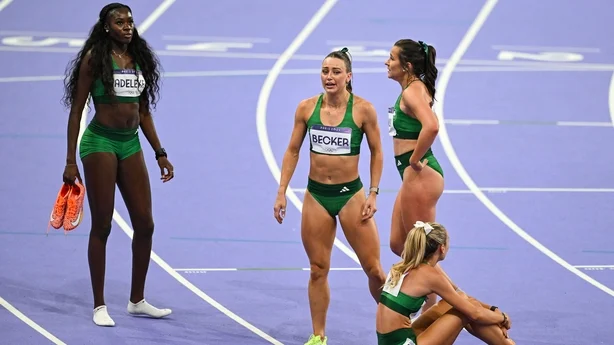
The focus was on Sophie Becker, then Rhasidat Adeleke, then Phil Healy, then Sharlene Mawdsley. A TG4 colleague and I willed Mawdsley home. It wasn't to be. But what a crescendo. And then an hour later the place was empty, except for volunteers engaged in the clean-up. The purple track was no more, with the closing ceremony and Tom Cruise's arrival to come.
A fortnight earlier it all began with our men's Rugby 7s side taking to the pitch. Sadly, they were out of medal contention before the opening ceremony down the Seine. We witnessed a floating parade as the heavens opened. The organisers, no doubt cursing their luck. Plenty of French culture on view, with Lady Gaga and Céline Dion giving things an international dimension. A parody of Leonardo Da Vinci's famous fresco 'The Last Supper' featuring drag queens did cause some controversy.
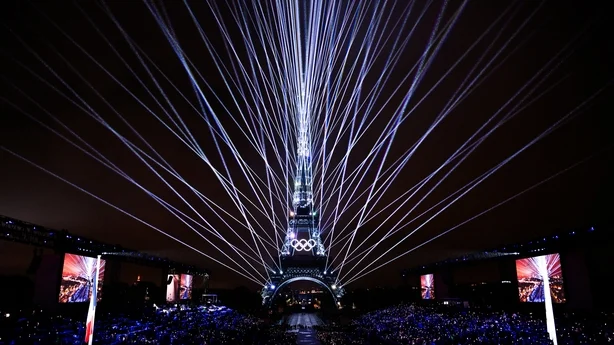
And then the Games began. Iconic Parisian venues visited, tight security in place. Volunteers, dressed in green, always in good spirits. The trains and metros not as busy as one would have thought. Maybe many of the locals did opt to leave for the fortnight. The Irish support at many of the venues was clearly visible, their cheering clearly audible at the athletics, swimming, rowing and golf. They certainly took advantage of it being a 'home' Games.
Spectacular thunderstorms at night looking for prominence against the huge drops of rain. You wake up in the morning and you're surprised to see no evidence of such meteorological turbulence. The sun then gets to work, its searing effect having no sympathy for any unprotected skin.
And then there were the rats paying no heed to this carnival of sorts on their doorstep; different shapes and sizes down the side streets and near the Eiffel Tower.
Aside from following the Irish story, we were also taken in by the success of Noah Lyles, Julien Alfred, Simone Biles, Leon Marchand, Katy Ledecky, Mondo Duplantis and Summer McIntosh. Some of the stars that we're likely to see again at LA 2028, hopefully alongside Irish competitors looking to add to their medal haul and those eyeing a spot on the podium for the first time
A delegation from the Olympic Federation of Ireland has already visited the Californian city to carry out an early recce.
The new OFI president Lochlann Walsh, in his first address, spoke about "finding additional commercial funding" so as to improve on "a really good Paris cycle".
Seven medals in '24, what about aiming for that round figure of 10 in '28?
It goes without saying that those countries who spend the most on Olympic programmes almost always lead the medal tables.
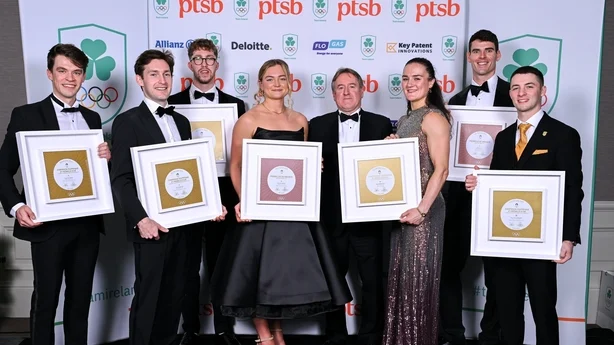
Micheál Martin, soon to be back in the Taoiseach's office, promised an extra €400million investment in sport on the day of Team Ireland's homecoming last August. In the recent General Election campaign, all the major parties produced manifestos that underlined their commitment to sport, whether it's by increasing participation, improving facilities, and again emphasising the health and mindfulness benefits of participation.
Labour, interestingly, are proposing that football be a transition year subject in post-primary schools.
We'll see where the money is actually distributed, while also following the fortunes of our elite competitors as they work their way through this cycle in advance of LA.
But let's not forget Paris that magical eight-day period in which the medals were won. We can't forget those who endured the heartache, the frustration. Lots of stories were told, those on the ground and those looking on from afar were all equally invested in what unfolded before our eyes.
